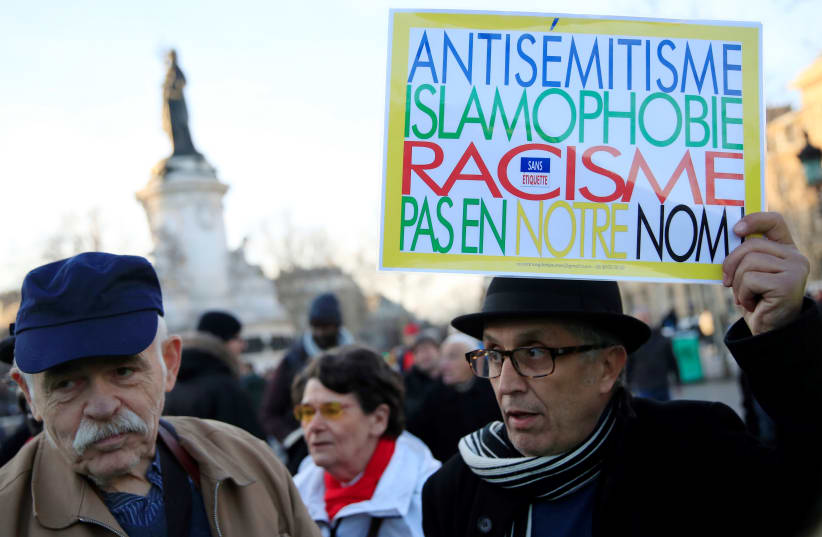The latest European Union report on antisemitism begins with a stark warning. “These findings make for grim reading,” writes Michael O’Flaherty, director of the EU Agency for Fundamental Rights (FRA), in the foreword.
Focusing on younger Jews, aged 16-34, the report presents their perceptions of the extent of antisemitism in their own countries. Their cumulative, widespread pessimistic views raise anew key questions about the security of Jews in Europe today and the very future of these communities when younger Jews feel more vulnerable than their older brethren.
The report emphasizes that “younger Jewish Europeans are considerably more likely than either of the other two older cohorts to experience antisemitism.” Indeed, 45% of them say they have been a victim of at least one antisemitic experience in the 12 months prior to the survey.
Only 17% of young Jewish Europeans think that their governments combat antisemitism effectively. Older cohorts do not fare better, with 21% of those aged 35-59 years old and 29% of those 60 and over agreeing with an overall damning evaluation of inadequate governmental responses.
Distrust of law enforcement is strong, reflected in the 80% of younger Jews who did not report harassment incidents to authorities, as well as the 51% of those who suffered antisemitic violence and chose not to contact law enforcement.
The data in the recently released report was gleaned from FRA’s 2018 survey of 16,500 European Jews in 12 European countries. “Antisemitism has become ‘normalized’ across the EU,” FRA concluded in that study of hate crimes and discrimination against Jews. The 16-34 years old group comprised 2,707 people, or 17% of the total sample.
In one significant illustration of the gravity of the situation, 41% of the younger Jews have “considered emigrating from the countries in which they live because of their fears for their safety as Jews,” and one-third of them already have made plans to leave.
As for possible destinations, only 10% said they intended to remain within one of the EU countries. While data is “scant” on how many European Jews have emigrated to other countries, many of the younger ones who are contemplating leaving “see Israel as their most probable destination,” states the FRA report.
That preference is not surprising given the general intimacy younger European Jews hold with Israel. “Israel features prominently in the lives and identities of young Jewish Europeans,” notes the FRA report. “Nine in 10 have been there, and three quarters have family or relatives living there.”
Still, another factor giving younger Jews in Europe pause about their future and reinforcing their interest in possibly moving is their palpable sense of vulnerability when some proponents of antisemitism exploit the Arab-Israeli conflict to harass, attack Jews in Europe.
Only 10% of young European Jews says the conflict has no impact on how safe they feel as Jews living in their country, while 37% say it affects them “a great deal.”
Younger Jews are more likely than the older cohorts to say that people in their countries accuse or blame them for anything done by the Israeli government. Eighty-four percent say that people in their countries accuse or blame them for anything done by the Israeli government, with 24% of them saying this is done “all the time.”
Among the 25-59 age group, 82% say they are blamed for Israeli actions, but only 15% say it’s done “all the time,” while 73% of those 60 and over say they are blamed and only 8% say it’s “all the time.”
THE FRA data does not provide breakdowns by country, but an AJC survey of Jews in France, released on June 2, found that 55% had seriously considered migrating during the past 12 months. Of those who had considered emigration, 17% said it is “mostly because of fear for the future of Jews in France,” 21% cited economic reasons, 12% generally fear for the future of France, and 5% pointed to religious or cultural attractions elsewhere.
The FRA report on younger Jews is another indication that the EU is increasingly taking more seriously the urgency of combating antisemitism. “We must fight antisemitism more effectively by tackling it at its roots, no matter how difficult that is. Both educational and criminal law measures can play an important role,” writes O’Flaherty in the new report. The FRA director urges “policy-makers to intensify their efforts in these areas.”
The series of FRA reports on antisemitism in Europe are important contributions to the research informing EU and individual member states’ leadership as they continue to seek effective strategies and policies to effectively combat the visceral hatred of Jews.
With antisemitism in various forms continuing to rise on European soil nearly 75 years after the end of World War II and the Holocaust, and many younger Jews sensing hostility and thinking of leaving, this challenge demands enhanced priority attention.
The writer is the American Jewish Committee’s director of media relations.
